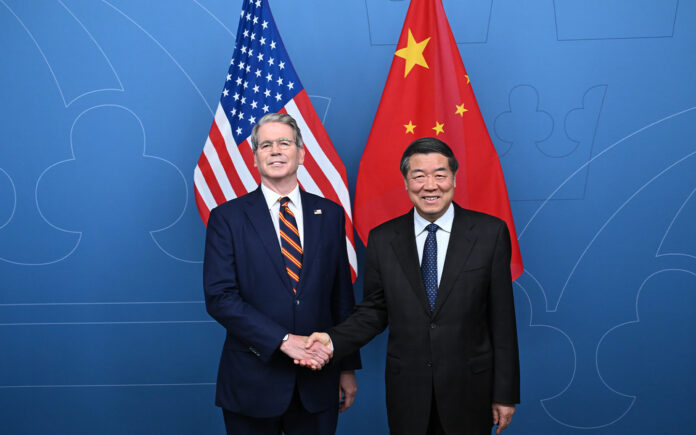Top U.S. and Chinese officials ended two days of trade talks in Stockholm with an agreement to work toward extending their 90-day tariff truce, which is set to expire on August 12.
Both sides described the talks as constructive.
U.S. Treasury Secretary Scott Bessent said any final decision on the truce extension would be made by President Donald Trump. Speaking to reporters after the meetings, Bessent said the discussions covered economic cooperation, implementation of earlier agreements, and issues such as rare earths.
Chinese trade negotiator Li Chenggang confirmed that both countries agreed to try to preserve the truce, under which some tariffs were suspended. Without an extension, U.S. officials said tariffs could rise again, reversing progress made since May.
President Trump, speaking to reporters on Air Force One after returning from Scotland, said he would be briefed on the meetings and confirmed that he had already spoken with Bessent.
The U.S. first raised tariffs on Chinese goods earlier this year. China responded with its own tariffs, and both sides imposed further measures until a temporary truce was reached in May. That agreement left Chinese goods facing an additional 30% tariff and U.S. goods facing a 10% tariff in China.
This was the third meeting between U.S. and Chinese officials since April. In addition to tariffs, the U.S. raised concerns over China’s trade with Russia and Iran, access to rare earth minerals, and the future of TikTok.
Bessent said the U.S. wants to reduce risks in certain industries, including semiconductors, rare earths, and medicine, but is not seeking to fully separate its economy from China.
U.S. Trade Representative Jamieson Greer said the trade gap with China, which reached $295 billion last year, is on track to narrow by $50 billion this year.
Bessent said he felt the talks were more open than previous rounds and noted recent trade deals with Japan and the European Union had created momentum for broader negotiations with China.




